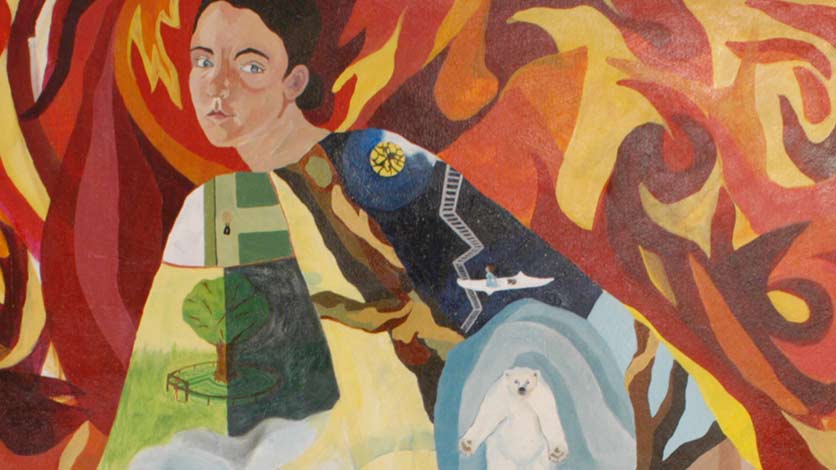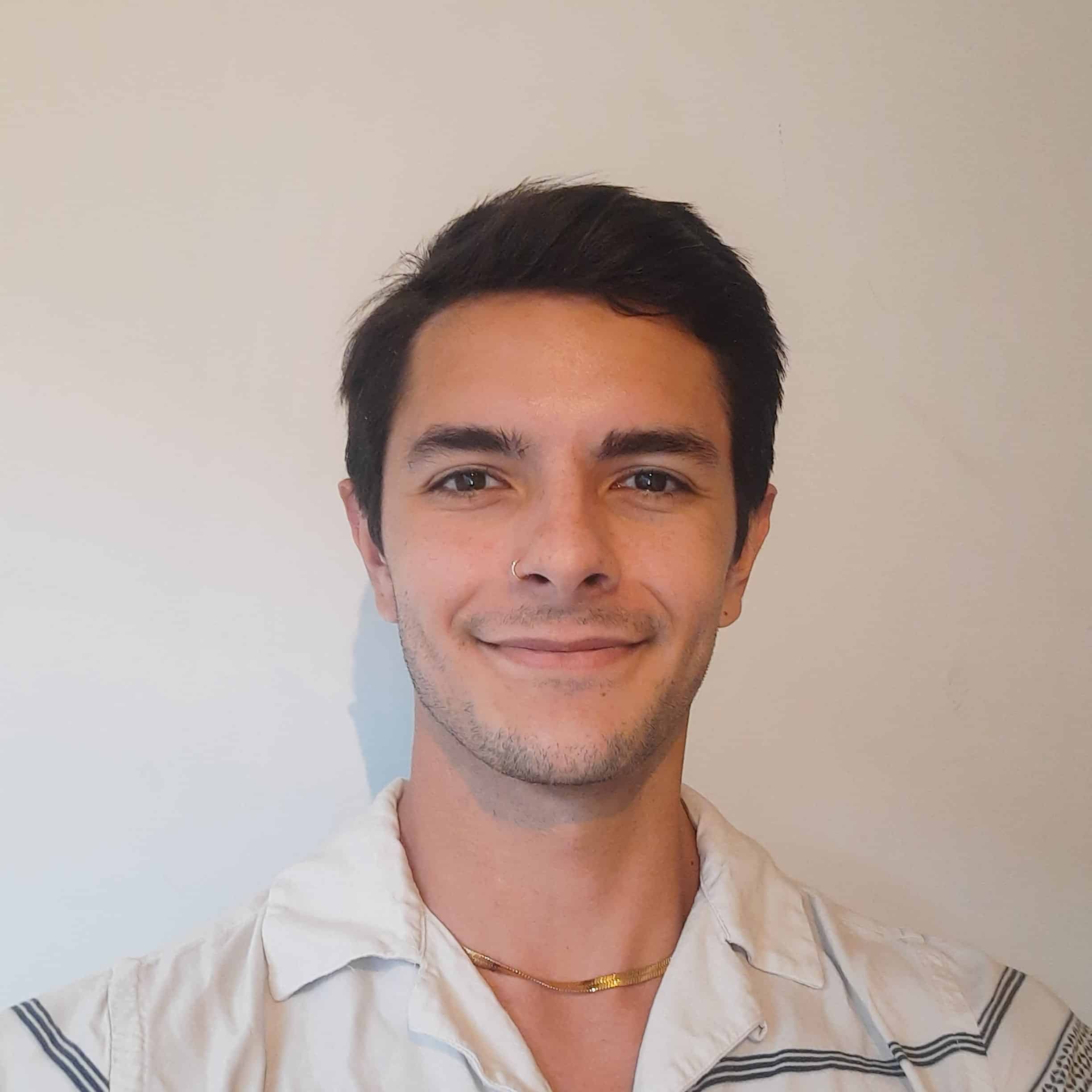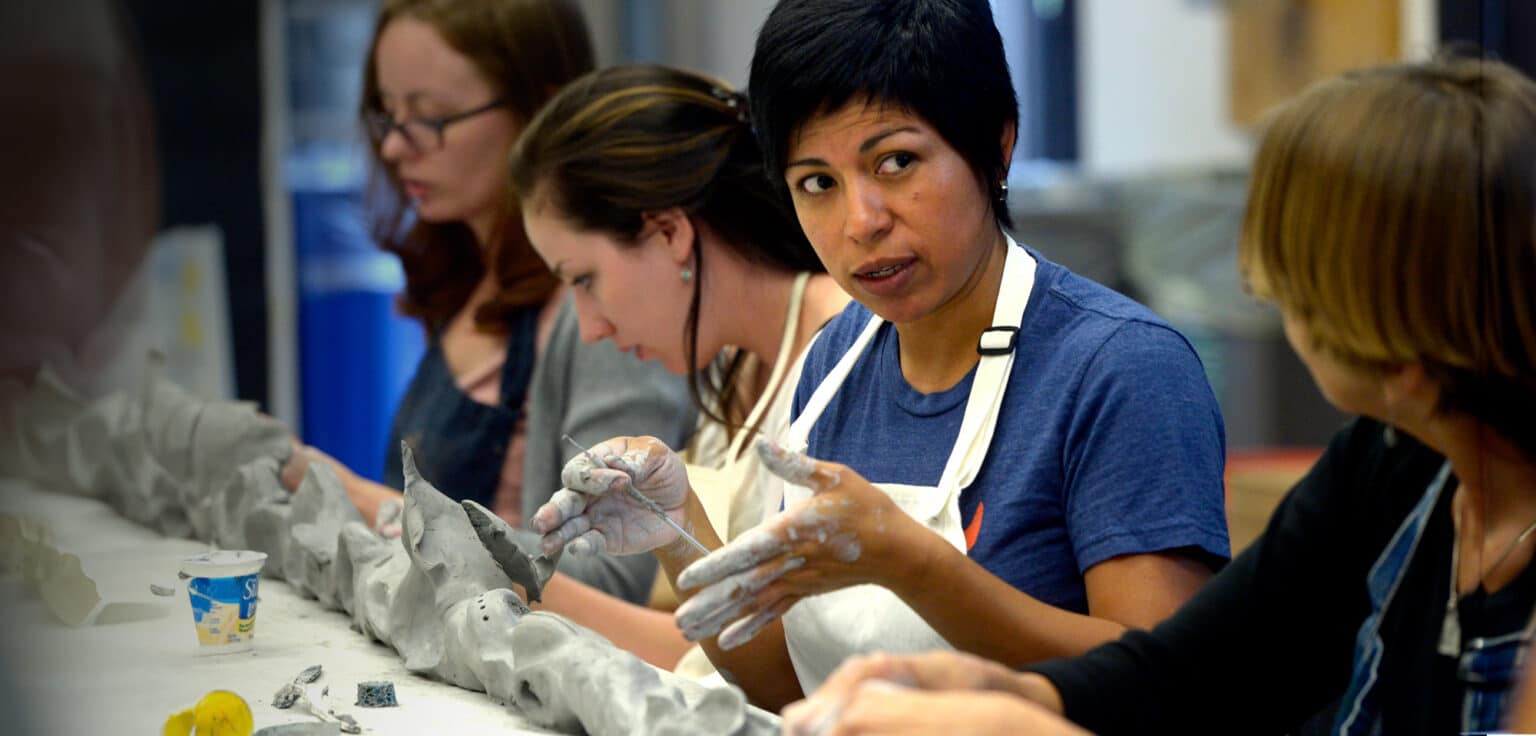Clinical Mental Health Counseling MA
Transpersonal Contemplative Art–Based Counseling Concentration
Naropa’s Transpersonal Contemplative Art–Based Counseling integrates transpersonal theory with a clinical approach to counseling. This concentration of our Clinical Mental Health Counseling graduate degree program helps you—and your future clients—find healing through the transformative power of art.
About this Concentration
The foundation of this concentration program is mindfulness meditation training, studio art, community-based service, and integration of transpersonal theory with clinical approaches to counseling.
Our clinically focused Transpersonal Contemplative Art–Based Counseling program exists to prepare art-based counselors in the cognitive (knowledge), psychomotor (skills), and affective (behavior) learning domains.
This program is accredited by the Commission on Accreditation of Allied Health Education Programs (CAAHEP) upon the recommendation of The Accreditation Council for Art Therapy Education.
Community Engagement
Naropa’s CMHC concentration program in Art-Based Counseling is dedicated to developing socially engaged creative arts counselors. Students engage with the community through practicum and internship, offering art-based counseling services in a variety of clinical settings. The Naropa Community Art Studio (NCAS) teaches students how to design, create, and finance a community studio space to serve diverse groups of people.
Social Justice Focus
Being a counselor requires awareness of one’s own social context, and the social context of those we serve. Naropa’s Transpersonal Contemplative Art–Based Counseling master’s program requires counselors-in-training to take courses with a social justice and multicultural approach.
Expert Faculty
Naropa’s award-winning Transpersonal Contemplative Art–Based Counseling faculty are published authors, accomplished artists, and community innovators with extensive clinical experience.
Quick Facts
- On-Campus Degree
- 67.5 Credit Hours
- Accredited by the Commission on Accreditation of Allied Health Education Programs
- Data on Retention Rates, Graduation Rates & Employment
- Naropa Community Art Studio—Community-focused Social Engagement Project Integrated into Curriculum
- 3 Years of Studio Art & Clinical Experience
- 750–1,000 Supervised Clinical Hours
- Expert Faculty
- Now Accepting Applications for August 2025
Program Format
The Clinical Mental Health Counseling: Transpersonal Contemplative Art–Based Counseling Concentration is a 3-year on-campus degree.
It consists of specific art-based counseling coursework combined with counseling and contemplative studies training to prepare competent entry-level counselors holistically.
Throughout the program, students also participate in 190 direct art contact hours of studio-based work. The program is accredited by the Commission on Accreditation of Allied Health Education Programs upon the recommendation of The Accreditation Council for Art Therapy Education.

Course Spotlight
Studio I: Inquiry, Process & Materials
Degree
Requirements
The Transpersonal Contemplative Art–Based Counseling Concentration is a 67.5-credit program. Besides completing regular coursework, students are required to complete a Counseling Practicum during their second year, to develop their counseling skills through fieldwork at a community agency with on-site supervision. During their third year, students will complete a 700-hour clinical field placement with on-site supervision.
Counseling Experiential Requirement:
Each student must participate in a counseling/therapy relationship with a qualified psychotherapist of their choice. A minimum of fifteen 50-minute face-to-face sessions (via telehealth or in person) within the first two years of the program is required. (The term “psychotherapist” is used to be inclusive of licensed providers from a variety of professional mental health backgrounds. The Student Guidebook outlines specific parameters of a qualified psychotherapist.)
Course Schedule
Fall Year 1 (11 credits)
- CMHC 600, Foundations and Orientation of Clinical Mental Health Counseling (3)
- CNSA 600, Orientation Seminar (0)
- CNSA 604, Foundations of Transpersonal Art Therapy in Counseling (3)
- CNST 622, Foundations of Mindfulness (2)
- CNSA 634, History and Theory of Art Therapy (3)
Spring Year 1 (12.5 credits)
- CMHC 603, Counseling and Helping Relationships I (3)
- CMHC 601, Social/Multicultural Foundations (3)
- CNSA 664, Civic Engagement Studio Practicum (0.5)
- CMHC 606, Legal and Ethical Aspects of Counseling (3)
Choose One of the following:
- CNST 670, Transpersonal Counseling (3)
- CNST 673, Jungian Approaches in Counseling (3)
Fall Year 2 (11 credits)
- CMHC 604, Counseling and Helping Relationships II (3)
- CMHC 602, Human Growth and Development (3)
- CMHC 605, Group Counseling (3)
- CNSA 755, Art-based Counseling with Adult Populations (2)
Spring Year 2 (11 credits)
- CMHC 607, Diagnosis and Treatment Planning (3)
- CMHC 620, Counseling Practicum (3)
- CNSA 624, Studio I: Inquiry, Process & Materials (2)
- CNSA 734, Art-based Counseling with Children & Adolescents (3)
Summer Year 2 (8 credits)
- CMHC 621, Initial Internship (2)
- CMHC 609, Research & Program Evaluation (3)
- CMHC 608, Assessment (3)
Fall Year 3 (7 credits)
- CMHC 615, Capstone I (1)
- CMHC 622, Internship I (3)
- CMHC 610, Career Development (3)
Winter Intersession Year 3 (0 credits)
- CMHC 623, Winter Intercession Internship (0)
Spring Year 3 (7 credits)
- CMHC 624, Internship II (3)
- CMHC 616, Capstone II (1)
- CNSA 834, Studio II: Inquiry, Process & Materials (1)
- CNST 721, Cultivating Mindful Presence (2)
Total: 67.5 Credits
Why Choose Naropa?
CAAHEP Accreditation
Naropa’s Art-Based Counseling program is accredited by the Commission on Accreditation of Allied Health Education Programs (CAAHEP) upon the recommendation of The Accreditation Council for Art Therapy Education.
Agency Network
Naropa has an extensive network of human service agencies where students can carry out their practicum and field placements. In addition to acquiring real work experience and developing their skills, students can connect with professionals and institutions in the field.
Licensure Support
Naropa provides Credentialing and Licensure support to students who want to obtain licensure or credentialing to practice Clinical Mental Health Counseling, even post-graduation.

How this Program Prepares You
Real-life professional experience
Transdisciplinary approach & skill set
Comprehensive & multifaceted program
Learning Outcomes
Students will demonstrate an ability to utilize subjective investigation with objective research methods.
Students will demonstrate applied art therapy and counseling knowledge as it pertains to case conceptualization skills.
Students will demonstrate applied knowledge of diversity awareness and social engagement within art therapy and counseling practice.
Students will demonstrate the clinical application of a transpersonal approach to art therapy.
Career Opportunities for Transpersonal Contemplative Art–Based Counselors
Alumni of this concentration program become art-based counselors and mental health clinicians who treat the whole person through a transpersonal, social justice lens. Build a fulfilling career that weaves your passion for studio art with your desire to help others.
Career opportunities for Transpersonal Contemplative Art-based Counseling graduates include:
- Mental Health Counselor: offer therapy services to improve well-being.
- Substance Abuse and Behavioral Disorder Counselors: aid patients in their recovery.
- Social and Human Service Assistant: aid people and communities in need.
- Mental Health and Substance Abuse Social Workers: support people in your community.
Discover Career Pathways for Transpersonal Contemplative Art–Based Counselors
Hear from a Graduate
FAQS about the
Transpersonal Contemplative Art–Based Counseling Concentration
What is Transpersonal Art Therapy?
Written by Michael A. Franklin, PhD, ATR-BC
Transpersonal psychology is viewed within the graduate art therapy program as an evolving, researched discipline that integrates established models of psychology with valuable subjects from spiritual disciplines and wisdom traditions. This transdisciplinary assimilation, which strives to prevent cultural appropriation, results in a comprehensive model of psychology.
Transpersonal Art Therapy draws on this wide ranging premise through its core value to embrace the imaginal elements of the creative process as a rich healing opportunity. Any artistic act is a sample of multiple behaviors (cognitive, affective, kinesthetic, contemplative and spiritual), leading to the awareness that to form materials and processes is to transform oneself through art—we can literally create our way out of and through our suffering. The living image that results from the art process is the true teacher of this path. An art therapist working within the transpersonal approach strives to remain open to differences and to work for change at personal, cultural, institutional, and spiritual levels of transformation. Overall, this work is offered with empathic intentions, compassion for self and other, and the desire to transformatively serve communities and larger social systems.
The program is a concentration of our Clinical Mental Health Counseling MA Degree.
Is this concentration available online?
This concentration is not available online; however, the Mindfulness-Based Transpersonal Counseling concentration has a low-residency option. In addition, Naropa offers an online BA program in Art Therapy.
What are the benefits of Transpersonal Contemplative Art–Based Counseling?
Transpersonal Contemplative Art–Based Counseling benefits both individuals and communities. The benefits include self-reflection and self-awareness, improvement of self-esteem, confidence, interpersonal skills, and creativity. This type of counseling also enhances the connection between body and mind and helps clients develop healthy coping mechanisms and better interpersonal skills, among other things. It also reduces stress, anxiety, depression, and fatigue. It has a positive effect on both mental and physical health.
What is specific to the Transpersonal Contemplative Art–Based Counseling program?
Transpersonal Contemplative Art–Based Counseling draws on a discipline with a well-documented history. It refers to a distinct approach that incorporates transpersonal psychology—an evolving, researched discipline that integrates established models of psychology with valuable understanding from spiritual disciplines and wisdom traditions—with the use of art and image to support the healing process. The term transpersonal encompasses a broad spectrum of practices that connect artistic self-expression with healing.
Learn more about transpersonal contemplative art-based counseling in our suggested reading list for this concentration.
What skills do you need to become a Transpersonal Contemplative Art–Based Counselor?
Why is the program no longer called Transpersonal Art Therapy?
This name change reflects our continued commitment to Naropa’s contemplative foundations, an ongoing engagement with the transformative power of art and image, and alignment with a core counseling focus, grounding our students with relevant, contemporary skills to creatively support the multiplicity of mental health needs in today’s world. Read more about the name change and redesigned curriculum.
Learn More About the Program

Connect
with your counselor
Matt Rivera
Graduate Admissions Counselor

Connect
with your counselor
Matt Rivera
Graduate Admissions Counselor
Ready to Apply?
Admission Requirements
As an institution founded on the values of academic excellence and contemplative practice, Naropa University values both academic performance and the willingness to carry out introspective work.
Learn more about admission requirements and the application process for this concentration.
Graduate Students
To apply to the Transpersonal Contemplative Art-based Counseling concentration program, students must fulfill prerequisite work requirements in both Studio Art and Psychology.
Applications are submitted online, and applicants must provide a transcript of all undergraduate coursework, a copy of their art portfolio, a statement of interest, a resume, and two letters of interest as part of their online application. They may also apply for financial aid at this stage. If an applicant meets the qualifying criteria, they will be contacted for an interview day.
Learn more about admission requirements.
International Students
Naropa welcomes international students! On top of regular admission requirements, we ask that students with undergraduate degrees from foreign universities provide some additional documentation. Discover admission requirements for international students.
Costs and Financial Aid
Graduate Scholarship Opportunities
Scholarships are a great way to help with the costs of going to school. Naropa University offers an array of scholarship opportunities to graduate students. Students may be eligible to receive scholarships through their admissions application, by applying for scholarships, or by being nominated for a scholarship. For more detailed information about the different scholarships available and how to receive them, please review our graduate scholarship page.




